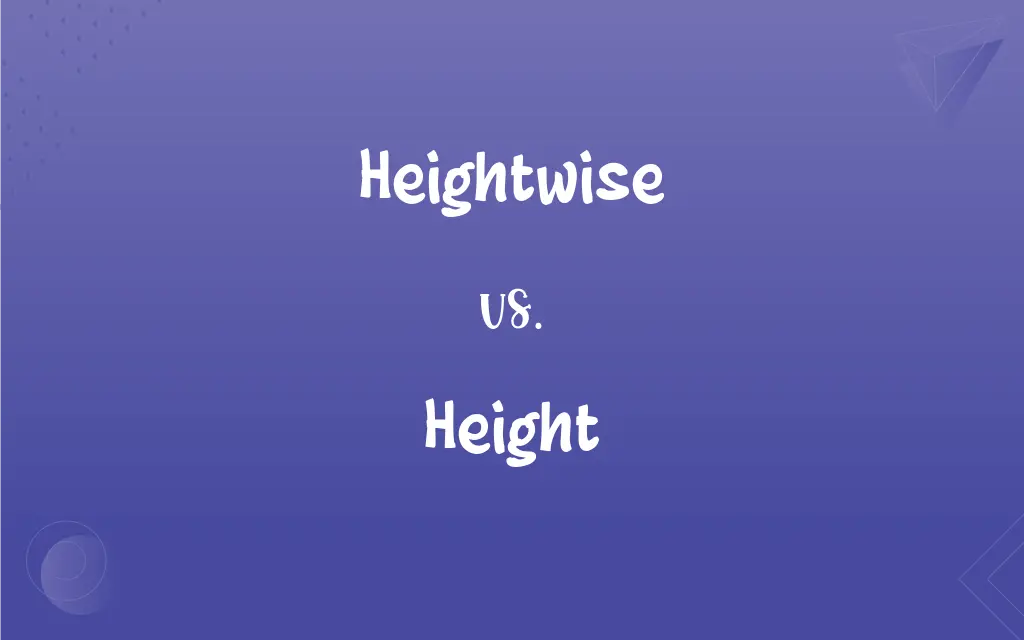Heightwise vs. Height: What's the Difference?
Edited by Harlon Moss || By Aimie Carlson || Updated on November 13, 2023
"Heightwise" refers to the orientation or comparison in terms of height, while "height" is the measurement of how tall something is.

Key Differences
"Heightwise" is an adverb describing the direction or arrangement according to height, whereas "height" is a noun representing the distance from the base to the top of something.
When sorting or comparing objects "heightwise," their relative heights are considered, while discussing an object's "height" focuses on its specific vertical measurement.
"Heightwise" is used in contexts where height is a basis for differentiation or orientation, in contrast to "height," which is a physical attribute of an object or person.
In design, arranging shelves "heightwise" might mean in ascending or descending order of their heights, whereas "height" would refer to the measurement of each shelf.
"Heightwise" could imply a comparison (e.g., lining up heightwise), while "height" is used to state how tall something is, like the height of a building.
ADVERTISEMENT
Comparison Chart
Part of Speech
Adverb
Noun
Usage
Refers to orientation or arrangement
Measures vertical extent
Context
Comparing or arranging by height
Describing how tall something is
Example Application
Aligning items based on height
Measuring the tallness of an object
Implication
Direction or order in terms of height
Specific measurement of tallness
ADVERTISEMENT
Heightwise and Height Definitions
Heightwise
Comparing or contrasting based on height.
The children lined up heightwise for the photo.
Height
The measurement from base to top.
The height of the mountain is impressive.
Heightwise
Referring to the arrangement in a vertical direction.
She organized the plants heightwise in the garden.
Height
The peak or zenith of something.
The company reached its height in the '90s.
Heightwise
In terms of height orientation.
The books were arranged heightwise on the shelf.
Height
The extent or distance upward.
The bird flew to a great height.
Heightwise
In a manner relating to height.
Heightwise sorting makes it easier to find files.
Height
Stature or tallness of a person or object.
His height made him stand out in the crowd.
Heightwise
Concerning the dimension of height.
Heightwise, the new tower is the tallest in the city.
Height
A high place or area.
They reached the height of the hill by noon.
Heightwise
In terms of height; vertical.
Height
Abbr. h The distance from the base of something to the top.
Heightwise
In a heightwise manner.
Height
Elevation above a given level, as of the sun or a star above the horizon; altitude.
Height
The condition or attribute of being relatively or sufficiently high or tall
Height is an advantage in basketball.
FAQs
What contexts are appropriate for using "heightwise"?
"Heightwise" is appropriate when discussing arrangement or orientation by height.
Is "height" a quantitative measure?
Yes, "height" is a quantitative measurement of tallness.
How is "height" commonly used?
"Height" is used to specify how tall something or someone is.
Can "heightwise" be used for comparisons?
Yes, "heightwise" is often used to compare heights.
Can "height" refer to the peak of something?
Yes, "height" can also mean the peak or zenith of something.
How does "height" relate to physical dimensions?
"Height" is a key dimension, measuring vertical extent.
What does "heightwise" indicate in a sentence?
"Heightwise" indicates orientation or arrangement according to height.
Is "heightwise" used in spatial organization?
Yes, "heightwise" is used in spatial organization and layout.
Can "heightwise" be used in education?
Yes, "heightwise" can be used in educational contexts, like arranging students.
Can "height" vary based on context?
Yes, the meaning of "height" can vary depending on the context.
Is "heightwise" a formal term?
"Heightwise" is more informal and used in everyday contexts.
Is "height" used in both everyday and technical language?
Yes, "height" is used in everyday conversations and technical discussions.
Does "heightwise" imply a certain direction?
Yes, "heightwise" often implies a vertical or upward direction.
Can "heightwise" refer to a method of sorting?
Yes, "heightwise" can refer to sorting items based on their height.
Is "height" a relative measurement?
"Height" can be relative or absolute, depending on the reference point.
Does "heightwise" have specific usage in sports?
"Heightwise" can be used in sports for arranging equipment or players.
Can "height" be used figuratively?
Yes, "height" can have figurative meanings, like reaching the height of success.
How is "height" used in geography?
In geography, "height" refers to the elevation of landforms like mountains.
Is "heightwise" commonly used in interior design?
Yes, "heightwise" is used in interior design for arranging items.
How is "height" measured?
"Height" is typically measured from the base to the top of an object.
About Author
Written by
Aimie CarlsonAimie Carlson, holding a master's degree in English literature, is a fervent English language enthusiast. She lends her writing talents to Difference Wiki, a prominent website that specializes in comparisons, offering readers insightful analyses that both captivate and inform.
Edited by
Harlon MossHarlon is a seasoned quality moderator and accomplished content writer for Difference Wiki. An alumnus of the prestigious University of California, he earned his degree in Computer Science. Leveraging his academic background, Harlon brings a meticulous and informed perspective to his work, ensuring content accuracy and excellence.































































